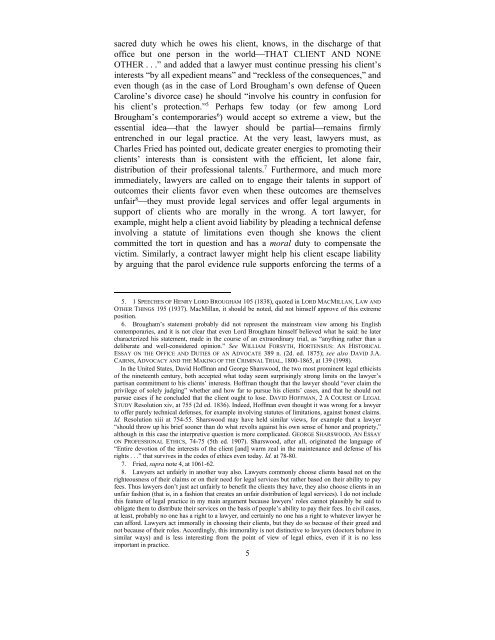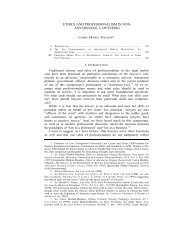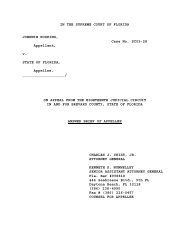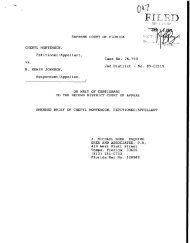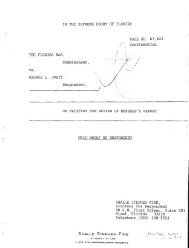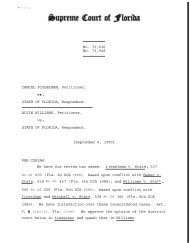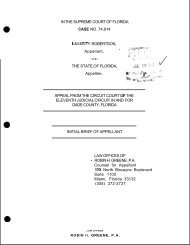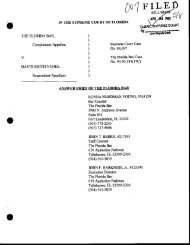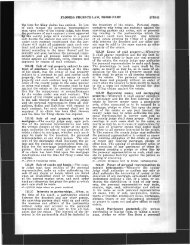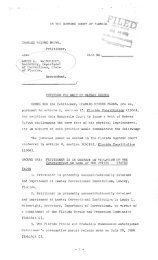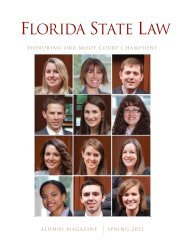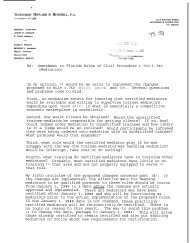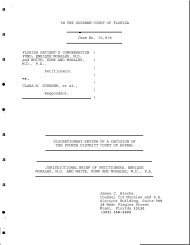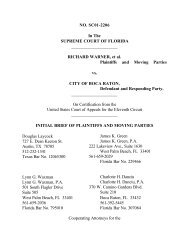The Morals and Politics of Adversary Lawyers - Florida State ...
The Morals and Politics of Adversary Lawyers - Florida State ...
The Morals and Politics of Adversary Lawyers - Florida State ...
You also want an ePaper? Increase the reach of your titles
YUMPU automatically turns print PDFs into web optimized ePapers that Google loves.
sacred duty which he owes his client, knows, in the discharge <strong>of</strong> that<br />
<strong>of</strong>fice but one person in the world⎯THAT CLIENT AND NONE<br />
OTHER . . .” <strong>and</strong> added that a lawyer must continue pressing his client’s<br />
interests “by all expedient means” <strong>and</strong> “reckless <strong>of</strong> the consequences,” <strong>and</strong><br />
even though (as in the case <strong>of</strong> Lord Brougham’s own defense <strong>of</strong> Queen<br />
Caroline’s divorce case) he should “involve his country in confusion for<br />
his client’s protection.” 5 Perhaps few today (or few among Lord<br />
Brougham’s contemporaries 6 ) would accept so extreme a view, but the<br />
essential idea⎯that the lawyer should be partial⎯remains firmly<br />
entrenched in our legal practice. At the very least, lawyers must, as<br />
Charles Fried has pointed out, dedicate greater energies to promoting their<br />
clients’ interests than is consistent with the efficient, let alone fair,<br />
distribution <strong>of</strong> their pr<strong>of</strong>essional talents. 7 Furthermore, <strong>and</strong> much more<br />
immediately, lawyers are called on to engage their talents in support <strong>of</strong><br />
outcomes their clients favor even when these outcomes are themselves<br />
unfair 8 ⎯they must provide legal services <strong>and</strong> <strong>of</strong>fer legal arguments in<br />
support <strong>of</strong> clients who are morally in the wrong. A tort lawyer, for<br />
example, might help a client avoid liability by pleading a technical defense<br />
involving a statute <strong>of</strong> limitations even though she knows the client<br />
committed the tort in question <strong>and</strong> has a moral duty to compensate the<br />
victim. Similarly, a contract lawyer might help his client escape liability<br />
by arguing that the parol evidence rule supports enforcing the terms <strong>of</strong> a<br />
5. 1 SPEECHES OF HENRY LORD BROUGHAM 105 (1838), quoted in LORD MACMILLAN, LAW AND<br />
OTHER THINGS 195 (1937). MacMillan, it should be noted, did not himself approve <strong>of</strong> this extreme<br />
position.<br />
6. Brougham’s statement probably did not represent the mainstream view among his English<br />
contemporaries, <strong>and</strong> it is not clear that even Lord Brougham himself believed what he said: he later<br />
characterized his statement, made in the course <strong>of</strong> an extraordinary trial, as “anything rather than a<br />
deliberate <strong>and</strong> well-considered opinion.” See WILLIAM FORSYTH, HORTENSIUS: AN HISTORICAL<br />
ESSAY ON THE OFFICE AND DUTIES OF AN ADVOCATE 389 n. (2d. ed. 1875); see also DAVID J.A.<br />
CAIRNS, ADVOCACY AND THE MAKING OF THE CRIMINAL TRIAL, 1800-1865, at 139 (1998).<br />
In the United <strong>State</strong>s, David H<strong>of</strong>fman <strong>and</strong> George Sharswood, the two most prominent legal ethicists<br />
<strong>of</strong> the nineteenth century, both accepted what today seem surprisingly strong limits on the lawyer’s<br />
partisan commitment to his clients’ interests. H<strong>of</strong>fman thought that the lawyer should “ever claim the<br />
privilege <strong>of</strong> solely judging” whether <strong>and</strong> how far to pursue his clients’ cases, <strong>and</strong> that he should not<br />
pursue cases if he concluded that the client ought to lose. DAVID HOFFMAN, 2 A COURSE OF LEGAL<br />
STUDY Resolution xiv, at 755 (2d ed. 1836). Indeed, H<strong>of</strong>fman even thought it was wrong for a lawyer<br />
to <strong>of</strong>fer purely technical defenses, for example involving statutes <strong>of</strong> limitations, against honest claims.<br />
Id. Resolution xiii at 754-55. Sharswood may have held similar views, for example that a lawyer<br />
“should throw up his brief sooner than do what revolts against his own sense <strong>of</strong> honor <strong>and</strong> propriety,”<br />
although in this case the interpretive question is more complicated. GEORGE SHARSWOOD, AN ESSAY<br />
ON PROFESSIONAL ETHICS, 74-75 (5th ed. 1907). Sharswood, after all, originated the language <strong>of</strong><br />
“Entire devotion <strong>of</strong> the interests <strong>of</strong> the client [<strong>and</strong>] warm zeal in the maintenance <strong>and</strong> defense <strong>of</strong> his<br />
rights . . .” that survives in the codes <strong>of</strong> ethics even today. Id. at 78-80.<br />
7. Fried, supra note 4, at 1061-62.<br />
8. <strong>Lawyers</strong> act unfairly in another way also. <strong>Lawyers</strong> commonly choose clients based not on the<br />
righteousness <strong>of</strong> their claims or on their need for legal services but rather based on their ability to pay<br />
fees. Thus lawyers don’t just act unfairly to benefit the clients they have, they also choose clients in an<br />
unfair fashion (that is, in a fashion that creates an unfair distribution <strong>of</strong> legal services). I do not include<br />
this feature <strong>of</strong> legal practice in my main argument because lawyers’ roles cannot plausibly be said to<br />
obligate them to distribute their services on the basis <strong>of</strong> people’s ability to pay their fees. In civil cases,<br />
at least, probably no one has a right to a lawyer, <strong>and</strong> certainly no one has a right to whatever lawyer he<br />
can afford. <strong>Lawyers</strong> act immorally in choosing their clients, but they do so because <strong>of</strong> their greed <strong>and</strong><br />
not because <strong>of</strong> their roles. Accordingly, this immorality is not distinctive to lawyers (doctors behave in<br />
similar ways) <strong>and</strong> is less interesting from the point <strong>of</strong> view <strong>of</strong> legal ethics, even if it is no less<br />
important in practice.<br />
5


